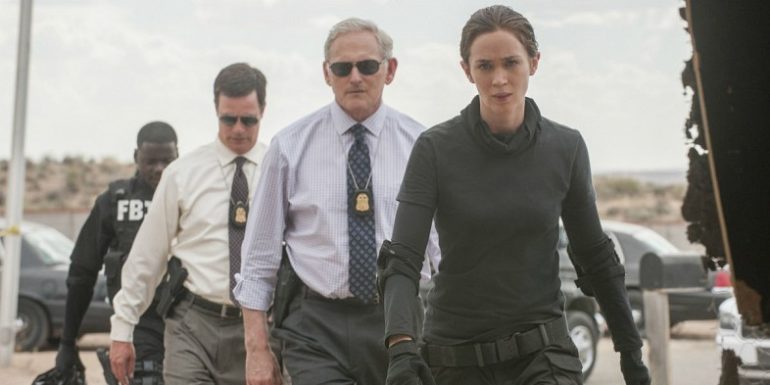Sicario starts as it means to go on, with a police truck bursting through a wall. An FBI SWAT team, led by Kate Mercer (Emily Blunt), executes a raid, on a suburban home in an Arizonan suburb, and the resulting chaos and shootout ends with a grim discovery. They discover dozens of victims of the Mexican cartels walled into the house itself, their bodies upright and undetected. Villeneuve’s knack for eye-catching imagery is still very evident; he holds the shot of whatever might shock for just that second too long. Yet, to what end? The authorities and the audience are rightly taken aback, but what comes next? Sicario is littered with such moments, designed to shock and surprise, but they operate within an overly-familiar framework with little to distinguish it.”
Shellshocked but still standing, Mercer finds herself the subject of not-altogether-welcome attention. The CIA have taken an interest in her grim discovery, but from the start you can tell this cannot end well, not least because CIA agent Graver (Josh Brolin) chews his gum with a smarmy aggression. Brolin bolsters his performance with just enough ham and sandal-wearing dorkiness to make it pleasantly memorable; he fits into a broad but oddly fun archetype, so he can bark lines like “Just give me the girl” to Mercer’s superiors and get away with it.
Graver needs Mercer on a jaunt south of the border for reasons that are initially unclear to either Mercer or the audience. She asks the necessary whats and whys, but it’s all hush-hush until the bullets start flying. They fly to Juarez and liaise with local connection Alejandro (Benicio del Toro). With this role, del Toro plays his second dodgy Latino lawyer this year, but at least Inherent Vice came armed with a playfulness that is alien to Sicario. Hints are dropped as to Alejandro’s role in the ensuing mission, but Taylor Sheridan’s script is good at withholding answers. Too good, in fact. By the time some character-based context is delivered, too much time and action has passed for it to matter. The whole first act, from after the initial raid to the Juarez mission, feels like a talky tease. Mercer is constantly being prepped for this mission, being made aware of the dangers and risks, but it only makes us wish the mission would get here sooner. It’s the kind of scene that Steven Soderbergh’s Traffic would have got out of the way quickly and cleanly, saving the chatter for afterwards, but Sicario is too preoccupied with its own grittiness to be that streamlined. At least the raid proves thrilling; the city is a world away from the U.S. and yet it sits right on its doorstep, with headless corpses hanging from overpasses and gunfire constantly echoing against the skyline.
Comparisons to the likes of Traffic are both unwelcome and unavoidable, but Sicario does little to set itself apart from hot topic thrillers with smarts to spare. The cartels have provided ripe pickings for storytellers of all shades, from Breaking Bad to this year’s Cartel Land. Sicario is undeniably tense at times, but it’s not saying anything that hasn’t already been said. Take the lead role, for example. Sicario has been billed as something of a turning point for Blunt, shorn of the genteel trappings of The Devil Wears Prada or The Young Victoria. Here’s a strong female leader battling on the frontlines, but so what? As far as physical action goes, Blunt more than proved her mettle by stealing the show in Edge of Tomorrow. As for Mercer, she’s just a few stops down from Jessica Chastain as Maya in Zero Dark Thirty. Blunt does fine in the role but, without spoiling things, Mercer ultimately becomes a pawn in a much more elaborate game. There are attempts at character here, but the harsh lessons of the cartel’s dealings are the order of the day. The murkiness of the world being investigated overwhelms the characters in more way than one.
There is some fine craft on display here. Jóhann Jóhannsson’s effective score is all ominous low strings. Meanwhile, a scene in which a group of paratroopers approach an underground tunnel network for a raid is one of the most memorable shots of the year, with DoP Roger Deakins silhouetting the soldiers against a slowly fading orange dusk. Again, though, it’s reminiscent of similar shots in many other films. Sicario’s only real failing is in saying nothing new; the ground it treads is so familiar now that the talent employed here adds little but window dressing. Effective as Sicario might be in the moment, there’s little to match the pure eerie creepiness of Villeneuve’s vastly superior Enemy. Drugs are bad, m’kay? Tell us something we don’t know.

